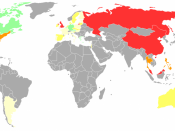The Ethical delimma of journalist Confidence and Privacy Society must have media law to protect confidentiality of people and organizations, as moral principles would not sometimes rescue them from journalism greed. The example of rape case would powerfully explain how important of media law is, in order to protect the victim. Furthermore, public figures such as Politicians and Film Stars are greatly suffering from the intrusion of privacy. Journalists must now have some strategies to minimize harm in particular case.
Breach of confidence is a civil remedy ordering protection against disclosure or/and use of non-public information without authority of person who has imparted it (Robertson &Nicol, 1990, p. 134). Press has rights to express beliefs and judgment about persons, but they might reveal unnecessary information, which brings embarrassment and painful facts to someone. Furthermore, some of information is still inappropriate and dangerous for public to know (Klaidman &Beauchamp, 1987, p.11).
The example of rape case would vigorously illustrate the importance of media law and the absence of journalism morality. Since the Criminal Justice Act 1988 there is restriction to keep rape complainants as anonymous in an effort to improve the rate of reporting to police. Once person has alleged as a victim of rape offence neither name nor address nor picture would be published or broadcast. However, there are three important exceptions to anonymity rule. Firstly, person may consent revealing of information to educate society. Secondly, media are free to identify complainants who are charged with perjury. Finally, identification is use to persuade witness to come forward, if anonymity would otherwise prejudice the defense. This media law has been protecting rape victims from journalism intrusion of privacy, as it showed before in 1975 half of the press reported complainant's name and address (Robertson &Nicol, 1990, pp.254-257). If there was no...



Great work!!!
i loved the essay..
i was doing a paper on the ethical principles of journalism and your points are so good! It totally helped me understand the topic.
Your referencing is perfect and so in the in-text citation! Good Job!
Thank you
0 out of 0 people found this comment useful.